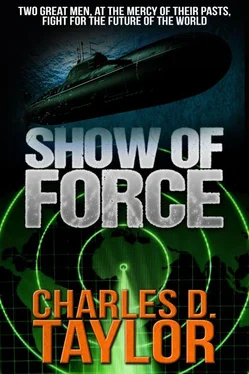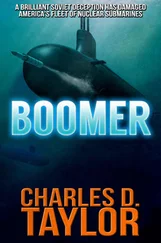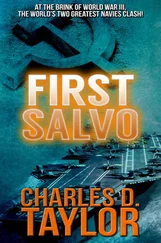"Sure you can, son. We're still slowing down. It'll come easier as we decrease speed." He had given the order as he felt Nimitz veer to starboard, but it took a long time to slow ninety-three thousand tons from the thirty-five knots she had been doing. It was the only way to lower the pressure on the bulkheads far enough from the explosion to hold back the water. "Just keep fighting it, but sound off just as soon as you feel anything different."
Reports were coming in from damage-control parties in other sections of the ship with casualty reports, calls for men and equipment, and reports of sections sealed off. Many men had already died from the four hits Nimitz had taken, yet they were a miniscule part of the entire crew. To a casual observer, it might even seem there was little damage to the ship, but the torpedo had impaired her seakeeping ability for the time being. It was impossible, at least now, to take evasive action from further attack.
And then the report came from Combat. "Aircraft, port quarter." The planes that Frank Welles whirled to find through his binoculars were already on top of Nimitz as far as he was concerned. They were miles away, but distance is of little value when missiles are being used. But the planes closed without firing. He couldn't understand why.
In flag plot, Bill Dailey reported, "Those are stragglers. Don't know where they came from. They got through our Tomcats: " The screen they both observed showed three Russian aircraft closing Nimitz with what were probably four Tomcats in pursuit. The American planes obviously had no missiles left and were probably firing machine guns at the wildly maneuvering Rigas. The latter were trying to evade both the weapons fired from the surface ships and the pursuing planes. As they closed Nimitz, one was hit. Yet it kept coming. Finally, as its maneuverability decreased, one of the Tomcats concentrated its fire on the damaged craft. Beginning to lose altitude, it vainly tried to lift its nose, then violently exploded into tiny pieces.
When Frank Welles saw that, he knew the Soviets were carrying very heavy bombs. Now the two remaining were in a screaming dive, growing larger and larger to the naked eye by the split second. A second one was hit by gunfire from a Tomcat. Its tail began to flake apart. The pilot was losing control but he fought his craft, trying to will it toward the carrier. As it became obvious to him that he would fall to the side, he yanked back his stick, forcing the plane's nose upward just enough to flip his bomb toward Nimitz. Then one of his wings broke off.
As Welles watched, fascinated, the bomb glided lazily toward the stern, too far away to hit the flight deck, but he knew it might be close enough to cause damage as it exploded. Suddenly his attention was riveted on the surviving Riga, the one making a picture-perfect attack and releasing its bomb. The Russian had been low enough and close enough, and the flight deck made a perfect target. Welles could not maneuver his ship.
The bomb penetrated just forward of the single elevator on the port side. Experts would likely say it penetrated at least two decks before it went off. When it did, in a missile storage area, the combined explosion was enough to blow the elevator straight up.
Frank Welles's initial impression was of a giant Roman candle. When the elevator reached its peak, flames shot past it hundreds of feet into the air. As the elevator descended, it was enveloped in fire. Then Frank Welles felt the impact as it tore more of the vital flight deck away. Only those deck personnel on the starboard side, awaiting the return of the first flight of aircraft, escaped the cascading flames.
Admiral Charles felt the main explosion in plot. This time the lights stayed on. The explosion had occurred above the water-line. But the impact, following so closely on the torpedo hit, told him that Nimitz was hurt. "I'm going to the bridge, Bill." Very little time had passed since the shooting began, maybe eight to ten minutes, yet hundreds of missiles had been fired by both sides, more than either of their computers could possibly defend against.
When David pushed through the door to the pilothouse, he was assaulted by a cacaphony of sounds, unlike the quiet, orderly flag plot. This is where the men were directing the fight to save their ship. Secondary explosions still came from the fire on the port quarter. Reports were too fast for Welles to assimilate. The ones he picked out that were more important received an answer. The remaining helos were low on fuel and desperately needed — to land. A Tomcat squadron was circling, hoping they would soon be able to see their landing field through the smoke. Then the smell hit David for the first time, a variety of odors of objects being consumed by the fire. He hung back, watching the ordered mayhem of a ship fighting for its life. No one recognized him, even though he was the only one without a life jacket or helmet.
David Charles inched his way out onto the starboard wing, picking up a pair of binoculars as he passed the chart table. Most of the damage was forward or on the port side, and the rear of the bridge was unoccupied except for a lookout, scanning the skies. David tapped him on the shoulder, "There's something I'm looking for over there." He pointed off the starboard quarter. "How about giving me a hand, see if we can find them together."
It was the same sailor who had watched the torpedo with Frank Welles, his eyes still like saucers. He simply nodded, too dumbfounded by the brass and terror around him.
"They should be about ten degrees abaft the beam… probably two or three of them… and they're pretty big.… See anything?"
"No, sir," then, "yes, sir. They look big all right, like tenders.… But those are the funniest looking ass ends on them, sir. I don't know what they are, sir."
"Well, we're even, neither do I." They stared through the glasses for a bit longer. "Now what the hell are they doing?"
The ships they were watching had slowed down. Their bow waves, standing out at high speed, had just as quickly disappeared. Then, first one, then another small craft appeared from their sterns. There were six in all, two from each of the large ships. They circled behind each of the parents for i just long enough to get organized. Then David saw them lift out of the water, pointing their bows toward Nimitz. "I'll be a son of a bitch." Before the sailor could ask what was going on David was into the pilothouse. Welles finally noticed him. "What speed can you make?"
"Well… Admiral… I… I imagine we could take her up to fifteen knots if we had too, but we're still shoring bulkheads up forward and I can't fan that fire on the port quarter." He thought more about the question. "For Christ's sake, why, David… Admiral?"
"Because you're about to come under a PT-boat attack, or something like that."
"Out here?"
But David already had a sound-powered phone in his hand. As he pressed the button for flag plot, he answered Welles, "Yes, out here. Only I don't know what the hell they're going to be like when they get closer." To the voice that answered on the other end, he said, "I want Dailey." He looked back at his old friend. "I don't know what they are, Frank. A little while ago we saw some odd-looking ships pulling up ahead of Lenin, and we asked for some pictures. Even then, we couldn't figure out what they were. Kupinsky wants this ship bad, Frank. Sinking Nimitz means everything to Gorenko. This is a symbol of what his navy has to do. If they can sink the most powerful ship in the world, then the world's going to know about it. And this is the damned worst time."
He turned back to the phone. "Bill, we got any fighters, or anything up there, that still have some ordinance?" He waited. "I don't give a shit if they're pop guns. Tell those pilots that if they want to land they're going to have to get every one of those small craft corning at us from the starboard quarter.… Yes, that's right. Those ships were some kind of amphib conversion. Two small craft in each one… surface-effect type.… They lifted right out of the water when they put the hammer down… probably carry torpedoes and rockets." He slammed the phone back in its cradle, and motioned Welles to follow him.
Читать дальше












